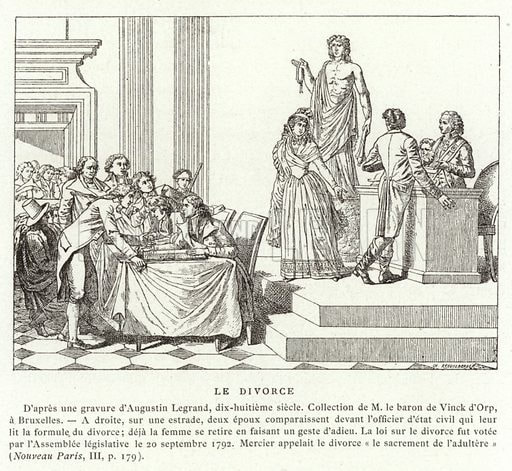|
In the Ancient Regime, a French marriage could only be annulled through a special dispensation from the pope. In 1792, divorce became legal. It was possible to divorce in two ways. First, a couple could decide they simply no longer wanted to be married. In this case, they simply had to wait six months after submitting a demand for divorce, and the divorce would be accepted after that period. One spouse could also ask for divorce for cause of cruelty, desertion, infidelity. Until the Napoleonic period, divorce was quite easy to obtain. Napoleon made it harder, and by 1816 it was no longer legal. The first divorce laws were drafted after 10 August 1792, when the republic was proclaimed. This was in spite of the Constitutional committee having decided that the Constitution of 1791 would remain, only with amendments pertaining to the King’s role (which would be deleted). But divorce was very much on everybody’s minds, and had been since 1789 when the freeing of France from despotism was likened to the freeing of a woman from marriage to a tyrannical husband. One defender of the Revolution wrote that France, ‘a nation for so long oppressed by despotism and its laws, all of a sudden becoming mistress of its own destiny, aspires for liberty…” (Comte D’Antraigue, quoted in Suzanne DesanThe Family on Trial in Revolutionary France. Berkeley: University of California Press. 2004, 15). So from the beginning the French saw strong connections between the state and the family, the public and the private. As soon as the revolution started, the public debate on marriage laws, which had already existed but been contained by the laws and the all powerful clergy, amplified. Women’s clubs throughout France discussed divorce, and the Cercle Social in Paris, and its women only offshoot, Le Club des Amis de la Verité, led by Etta Palm d’Aelders, spearheading the discussion.
In 1792, the divorce law was pronounced. Between January 1793 and June 1795, the assembly received large quantities of petitions – two thirds of which were written by women (sometimes badly written, depending on their social class and level of education) for divorces. 6000 divorces were pronounced during the course of these two and a half years. Women who petitioned typically expressed their wishes in terms of oppression and tyranny, and all those who petitioned were determined, one way of another to free themselves from the marriage chains. Republican freedom truly took its place in the family.
2 Comments
3/5/2022 10:07:44 am
The laws and the all powerful clergy, amplified. Women’s clubs throughout France discussed divorce, and the Cercle Social in Paris, Thank you for sharing your great post!
Reply
3/5/2022 10:41:38 am
The beginning the French saw strong connections between the state and the family, the public and the private, I truly appreciate your great post!
Reply
Leave a Reply. |
About
This is where I live blog about my new book project, an intellectual biography of three French Revolutionary women philosophers. Categories
All
Archives
November 2022
|

 RSS Feed
RSS Feed